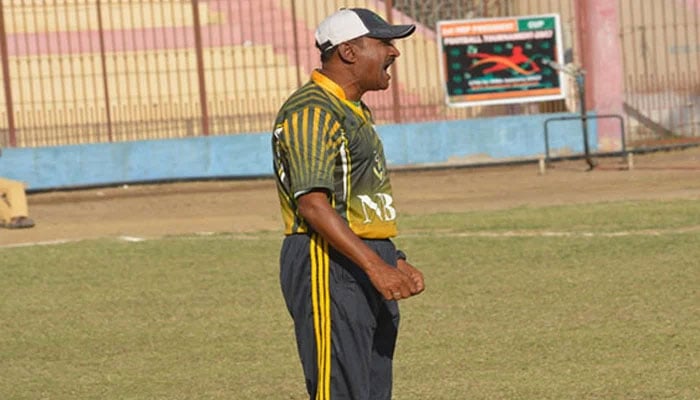Lack of coordination the reason behind defeat: Nasir
Pakistan’s head coach Stephen Constantine’s strategy was to concede minimum goals
LAHORE: Former Pakistan assistant coach Nasir Ismail on Thursday said that lack of coordination was seen in Pakistan’s football team against Jordan in their 2026 FIFA World Cup Qualifiers game.
“Lack of coordination was seen in the team as five successive passes were never seen at any stage of the game. They mostly played in their own zone and were quite defensive. They counter-attacked a little bit,” Nasir told The News after Pakistan went 3-0 down against Jordan at the Jinnah Stadium Islamabad on Thursday.
“Pakistan’s head coach Stephen Constantine’s strategy was to concede minimum goals and take chances on counter-attack,” he said. Nasir advised Constantine to force the PFF Normalisation Committee to hold a league of a few teams immediately after Ramadan so that he could get an opportunity to see home-grown talent which will help him divert his attention from the offshore players whom the country has been using.
“The local brand’s commitment is always more than the diaspora players. And I always say this,” Nasir was quick to add. “Overseas players may have an edge in skills over home-grown players but Pakistan’s local stuff’s aggression and commitment is more than the diaspora players,” Nasir said.
He said that Ramadan might have had an impact on both teams, especially Jordanian players who were not seen in their full physical and mental condition. “This is indeed a factor worth considering as fasting can affect performance, especially in a high-intensity sports,” Nasir said.
“I have highlighted the absence of proper long training camps and a domestic league in Pakistan for the past seven years. This can severely hinder the development of football in the country as players do not get sufficient opportunities to train, compete, and improve their skills,” Nasir said.
“I have already raised questions about the coach’s effectiveness, particularly if there is criticism regarding the national team’s performance and the utilisation of local talent. Coaches play a crucial role in developing a team’s strategy, tactics, and overall performance so it’s essential for them to understand the local context and work towards utilising available resources effectively,” said Nasir, also an AFC License A coach.
“We have various challenges and shortcomings within the Pakistan national football team, ranging from infrastructural issues to coaching decisions and team dynamics. Addressing these challenges will require concerted efforts from football administrators, coaches, players, and other stakeholders to improve the overall state of football in the country. This may involve investing in grassroots development programmes, reviving the domestic league, providing better training facilities, and ensuring that coaches are aligned with the long-term goals of the national team,” Nasir said.
-
 Inside Kate Middleton, Prince William’s Nightmare Facing Andrew Mountbatten-Windsor
Inside Kate Middleton, Prince William’s Nightmare Facing Andrew Mountbatten-Windsor -
 Margaret Qualley Shares Heartfelt Confession About Husband Jack Antonoff: 'My Person'
Margaret Qualley Shares Heartfelt Confession About Husband Jack Antonoff: 'My Person' -
 Savannah Guthrie Shares Sweet Childhood Video With Missing Mom Nancy: Watch
Savannah Guthrie Shares Sweet Childhood Video With Missing Mom Nancy: Watch -
 Over $1.5 Million Raised To Support Van Der Beek's Family
Over $1.5 Million Raised To Support Van Der Beek's Family -
 Diana Once Used Salad Dressing As A Weapon Against Charles: Inside Their Fight From A Staffers Eyes
Diana Once Used Salad Dressing As A Weapon Against Charles: Inside Their Fight From A Staffers Eyes -
 Paul Anthony Kelly Opens Up On 'nervousness' Of Playing JFK Jr.
Paul Anthony Kelly Opens Up On 'nervousness' Of Playing JFK Jr. -
 Video Of Brad Pitt, Tom Cruise 'fighting' Over Epstein Shocks Hollywood Fans
Video Of Brad Pitt, Tom Cruise 'fighting' Over Epstein Shocks Hollywood Fans -
 Jelly Roll's Wife Bunnie Xo Talks About His Huge Weight Loss
Jelly Roll's Wife Bunnie Xo Talks About His Huge Weight Loss -
 Margot Robbie Reveals Why She Clicked So Fast With Jacob Elordi
Margot Robbie Reveals Why She Clicked So Fast With Jacob Elordi -
 Piers Morgan Praised By Ukrainian President Over 'principled Stance' On Winter Olympics Controversy
Piers Morgan Praised By Ukrainian President Over 'principled Stance' On Winter Olympics Controversy -
 Halsey's Fiance Avan Jogia Shares Rare Update On Wedding Planning
Halsey's Fiance Avan Jogia Shares Rare Update On Wedding Planning -
 Instagram Head Adam Mosseri Says Users Cannot Be Clinically Addicted To App
Instagram Head Adam Mosseri Says Users Cannot Be Clinically Addicted To App -
 James Van Der Beek Was Working On THIS Secret Project Before Death
James Van Der Beek Was Working On THIS Secret Project Before Death -
 Las Vegas Father Shoots Daughter's Boyfriend, Then Calls Police Himself
Las Vegas Father Shoots Daughter's Boyfriend, Then Calls Police Himself -
 'Hunger Games' Star Jena Malone Shocks Fans With Huge Announcement
'Hunger Games' Star Jena Malone Shocks Fans With Huge Announcement -
 Ex-OpenAI Researcher Quits Over ChatGPT Ads
Ex-OpenAI Researcher Quits Over ChatGPT Ads




